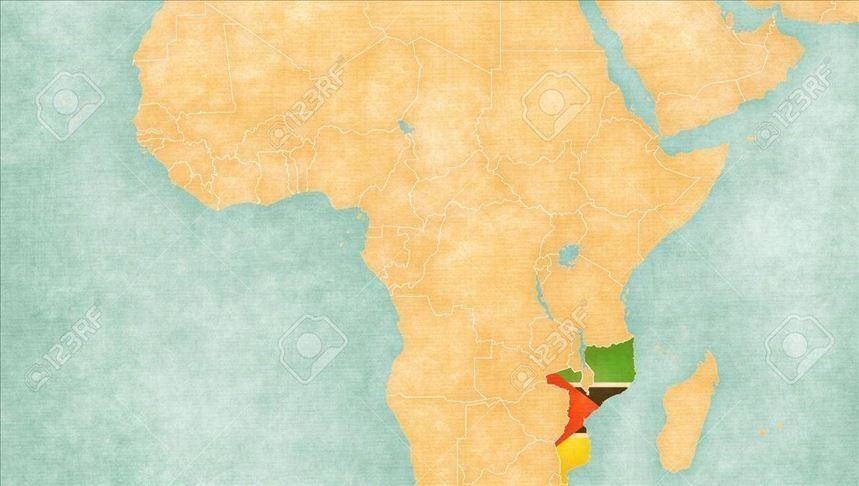Mozambique’s insecurity endangers cross-border trade
Tanzanian traders shun country’s markets, fearing terrorist attacks

MTWARA, Tanzania
A violent insurgency in Mozambique’s Cabo Delgado province has shattered informal cross-border trade with Tanzania which has for many years been the mainstay of the local economy as terrorists continue to wreak havoc, dashing hopes for improved livelihoods, according to local residents.
The region’s insecurity is an obstacle to cross-border trade, affecting the flow of manufactured goods and agricultural products, including maize and cashews, along with trade in livestock and timber as well as fishing activities, they said.
“I have stopped travelling to Mozambique and have since lost touch with almost all my customers,” said Hemed Kwiza, a garment vendor in Mtwara.
In October 2020, militants launched a deadly attack on a village near Tanzania’s port of Mtwara, a major oil and gas logistics base, after crossing the border from Cabo Delgado.
The attack signaled a worrying trend and expansion of terrorism, raising security concerns for people engaging in informal cross-border businesses, said local analysts.
Jehonaness Aikaeli, an economist from the University of Dar es Salaam, said informal cross-border trade is a major feature in the region’s economic and social landscape, supporting livelihoods and reducing poverty and food insecurity.
“The ongoing terrorism in Mozambique is a serious setback to transboundary trade with the potential to affect local livelihoods,” she told Anadolu Agency.
Social intercourse
According to Aikaeli, Tanzania and Mozambique’s economies are inextricably linked by cross-border trade and the social intercourse of the Makonde ethnic group.
Despite the growing insecurity, local Mozambican traders strongly believe that Tanzania remains a favorite trade destination thanks to affordable prices and friendly business relations with local suppliers.
“I love doing business with Tanzanians. They are good people. It is very sad that the terrorists want to break our business ties,” said Joachim Lange, a trader from the town of Palma in Mozambique.
Lange further said that Tanzanian authorities have always treated traders from Mozambique well and he hopes the crisis will soon be resolved.
“Since the outbreak of terrorism, doing business is becoming harder due to increased security vigilance,” he told Anadolu Agency.
Since April 2021, traders from Palma, who before the insurgency freely travelled to Mtwara to trade fish and other goods, have thus found it harder to access the port, especially when the Negomano border was closed.
Unabated trade
Despite the increased security presence on Tanzania’s southern border, an investigation by Anadolu Agency found that informal cross-border trade has in some areas continued unabated.
Local residents of Quionga, a township in northeastern Mozambique, said most consumer goods sold there are from Tanzania.
According to them, Chikongo village in Tanzania’s Tandahimba district is a good crossing that Mozambican traders have relied on for their supplies.
A spot check by Anadolu Agency revealed that informal business through porous border routes goes on unabated in some areas thanks to strong networks and relationships that persist without the knowledge of the authorities.
However, ever since Tanzania imposed a ban on the entry of its food products into the Mozambican territory through the Namoto border due to the conflict in Cabo Delgado, some traders in neighboring towns have suffered, said local residents.
“The conflict has changed the way we do business. The food business is hard to transact due to the restriction,” said Nancy Kilewo, a Mozambican businesswoman.
The Umoja Bridge over the Ruvuma River built in 2010 is an important driver of commercial, social and cultural relations between the people of Cabo Delgado province and Mtwara.
Since the insurgent attack on Palma in March 2021, which forced the closure of the Kilambo/Namoto border post in April that year, traders say more Ruvuma Basin trade has been routed through another border post at Negomano.
A few traders from Mueda, Montepuez and Pemba travel across Umoja Bridge to Tanzania to buy products including clothing, electronics and cosmetics, which are then sold on the Mozambican side, Anadolu Agency could establish.
Cashew trade
Cashew is an important cash crop for poor smallholder farmers, which is traded between Cabo Delgado and Mtwara. Although the trade has been disrupted by terrorism, locals say it is hardly halted.
Prior to the insurgency, local trade, small-scale investment and basic livelihood activities in the Ruvuma corridor straddling Mtwara and Cabo Delgado operated relatively freely, according to local residents.
Nanyumbu district commissioner Mariam Chaurembo said the government of Tanzania is determined to guarantee border security and is doing all it can to ensure that legally conducted business thrives.
“We encourage people to engage in lawful business. They should not use informal border crossings to bring their commodities,” she said.
Chaurembo warned traders from both countries to comply with official regulations and to avoid going through unauthorized routes.
“Nobody is allowed to transact illegal business. Our law is very clear on that,” she said.
In Kitaya, a village in Tanzania’s far south straddling marshes and located on the Mozambique border, a maze of stalls selling smuggled merchandise sits shuttered. Only one is open.
Out front, Jacob Mtima sits on a makeshift wooden bench. Behind him, plastic jerrycans full of petrol are stocked in the shade.
“We used to sell fuel to Mozambique fishermen, but it is hard because of terrorists,” said Mtima.
Another trader, Kassim Matumbi, who sells electronic equipment, said: “I am thinking of doing something else. It is very dangerous to go to Mozambique.”
In the impoverished southern Mtwara region, the local economy largely depends on a mix of legal cross-border trade and the smuggling of everything from fuel to electronics and food items.
But the outbreak of terrorism has shattered cross-border trade, pushing local communities to the edge of survival.
“I don’t want to travel to Mozambique. I am waiting for the situation to improve,” said Matumbi.
Anadolu Agency website contains only a portion of the news stories offered to subscribers in the AA News Broadcasting System (HAS), and in summarized form. Please contact us for subscription options.







